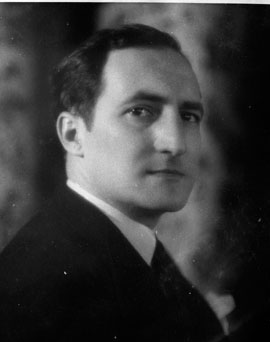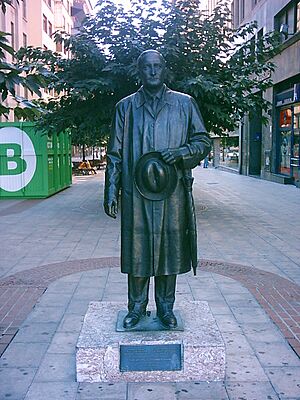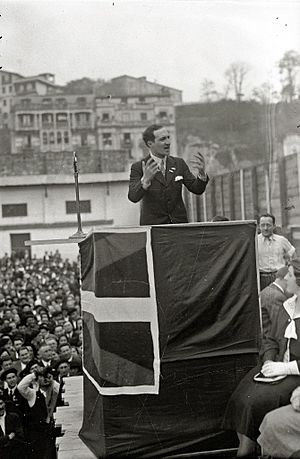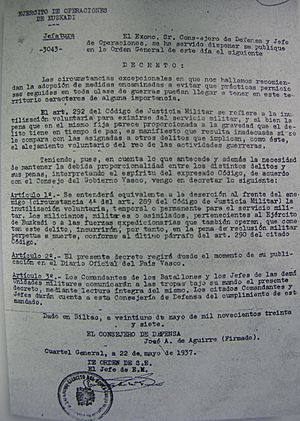José Antonio Aguirre (politician) facts for kids
Quick facts for kids
José Antonio Aguirre
|
|
|---|---|
 |
|
| 1st President of the Basque Country | |
| In office 7 October 1936 – 22 March 1960 |
|
| Preceded by | Office established |
| Succeeded by | Jesús María de Leizaola |
| Personal details | |
| Born |
José Antonio Aguirre Lecube
6 March 1904 Bilbao, Spain |
| Died | 22 March 1960 (aged 56) Paris, France |
| Political party | Basque Nationalist Party |
| Occupation | Lawyer |
José Antonio Aguirre y Lecube (born March 6, 1904 – died March 22, 1960) was an important Basque politician. He was a key member of the Basque Nationalist Party. Aguirre became the first president of the Basque Country's government during a difficult time. He also helped lead the defense during the Spanish Civil War. Under his leadership, the Basque government created the Basque Army to fight for the Second Spanish Republic.
Contents
Growing Up in the Basque Country
José Antonio Aguirre was born in Bilbao, Biscay, Spain. He went to the first Ikastola in the Basque Country. This was a special school where all the lessons were taught in the Basque language. Later, he studied law at the University of Deusto.
When he was 16, his father passed away. José Antonio had to help take care of his 10 younger brothers and sisters. His family moved to Algorta, a town near Bilbao.
After finishing his law studies, he started working in his family's chocolate business, Chocolates Aguirre. He eventually took charge of the company. He made many good changes for the workers, like offering free health care and paid holidays. He also gave some of the company's money to help people in need.
Aguirre was also a talented football player for Athletic Bilbao. He even won a major cup, the Copa del Rey, with his team in 1923. During the Spanish Civil War, he helped create the Basque Country national football team. This team played games in Europe and the Americas to raise money for Basque children who had to leave their homes.
In 1926, after serving in the military, he became a lawyer. He opened his own law firm, focusing on political issues and helping working-class people.
Spain was ruled by a dictator named Miguel Primo de Rivera at that time. Aguirre, who believed strongly in Basque nationalism, joined the Basque Nationalist Party. The party later split into two groups. Aguirre worked hard to bring them back together, believing that the Basque Country was more important than any disagreements. He successfully reunited the party in 1930.
He became more involved in politics and wrote articles for newspapers. In 1932, he even suggested that the party should welcome people who were not born in the Basque Country. This showed his desire for everyone to work together.
Early Political Steps
After the dictator Primo de Rivera left power in 1930, Spain entered a new political time. In 1931 and 1932, Aguirre played a big part in trying to get more self-government for the Basque Country. This idea, called "devolution," meant the region would have more control over its own affairs.
On November 5, 1933, people in Álava, Gipuzkoa, and Biscay voted on a plan for self-government. Most people voted yes. However, the plan was put on hold until October 1, 1936, when the Spanish Civil War began.
Leading During the Spanish Civil War
On October 7, 1936, José Antonio Aguirre was chosen as the first lehendakari, or president, of the Basque Country. This happened during the Spanish Civil War. After a special religious ceremony, he visited Guernica and took his oath of office in the Basque language.
Jainkoaren aurrean apalik,
Eusko Lur gainean zutunik,
asaben gomutaz,
Gernikako Zuhaizpean,
herri ordezkarion aintzinean
nere agindua ondo betetxea zin dagit.English translation:
"Humble in front of God,
Standing in our Basque lands,
Remembering our heritage,
under Gernika's venerable tree,
as president of my country,
I swear to serve my term faithfully."Oath of Office, 17 September 1936
A new government was formed with different political groups working together. This government ruled in Biscay for several months. The Basque Army, with about 100,000 soldiers, was made up of different groups. They had good weapons but needed more training and air support.
In June 1937, the forces of Francisco Franco broke through the defenses around Bilbao. Aguirre moved his government to another town, then to Santander, and finally to Catalonia. He wanted to keep fighting with his men.
Life in Exile

After the war ended, Aguirre had to leave Spain. Agents working for Francisco Franco chased him for many years. His journey took him to Paris, Berlin, and New York City. In June 1940, he received special documents that helped him escape France, which was then occupied by German forces.
Aguirre first went to France, where he helped organize camps and services for Basque refugees. He was in Belgium when Hitler's army took over that country. He then fled to Berlin, where he lived secretly with a false identity.
With the help of a Panamanian ambassador, Aguirre managed to reach Sweden. He avoided German intelligence and arrived in Rio de Janeiro, Brazil, in August 1941. He traveled under a false name, pretending to be Dr. José Álvarez Lastra, with his wife and children.
His true identity was almost discovered, so he traveled to Uruguay. The Uruguayan president, General Alfredo Baldomir, welcomed him with honors. On October 8, his arrival was announced in the newspapers, and his true identity was restored. He then received a visa to travel to New York.
In New York, Aguirre became a lecturer at Columbia University. After a special agreement between the US and Spain, he moved to France. There, the Basque government-in-exile was set up. Aguirre worked with the Allies during World War II, including the US Secretary of State and the CIA, to fight against their common enemies.
José Antonio Aguirre died in Paris on March 22, 1960, from a heart attack. He was 56 years old. His body was brought to Saint-Jean-de-Luz in the French Basque Country, where he was buried after a funeral Mass.
Legacy and Works
Aguirre's life story was turned into a folk play called Aguirre presidenta (meaning "President Aguirre"). He also wrote a book about his experiences called Escape Via Berlin: Eluding Franco in Hitler's Europe, which was published in New York in 1942.
See also
 In Spanish: José Antonio Aguirre para niños
In Spanish: José Antonio Aguirre para niños
- Tomas Agirre Lekube
 | Aaron Henry |
 | T. R. M. Howard |
 | Jesse Jackson |



